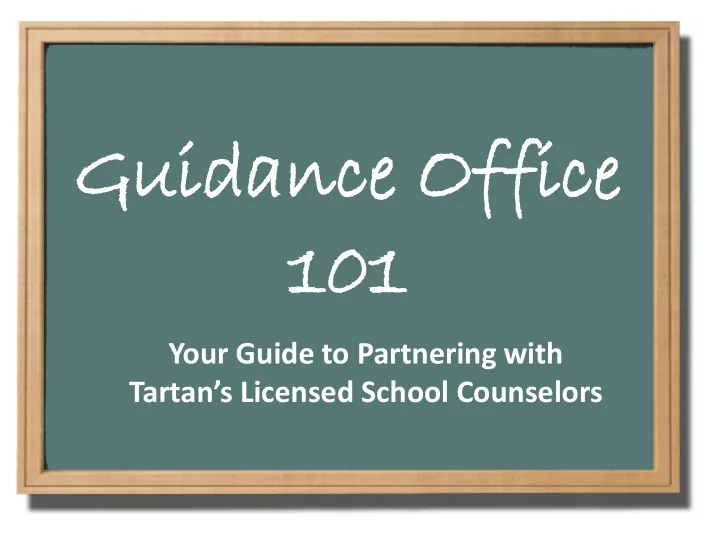

Gui Guidance dance Of Offi fice ce 10 101 Your Guide to Partnering with Tartan’s Licensed School Counselors
Tartan Counselors A-Fo Fo Fr Fr-L M-Sc Sc Se Se-Z sknudson@isd622.org abodurtha@isd622.org akaltved@isd622.org kthao@isd622.org
Background and Training • Master’s Degree in Professional School Counseling • Licensed by the MN Department of Education to counsel in a school setting • Required to obtain 125 hours of continuing education every 5 years in order to renew license
What Do We Do? We are licensed to provide: We can provide services through: • Academic counseling • Individual counseling • Career counseling • Group counseling • Personal/social counseling • Classroom guidance
What Does This Mean? For students: For parents: • Safe, confidential person to • Professional to consult with talk to • Resource for outside • Resource for career and assistance (tutoring, college choices therapy, college financial aid, etc.) • Advocate in school and out • Partner to help increase of school student opportunities for • Assistance with academic success skills
A Typical Day Might Include… • Meeting with 10-15 • Completing paperwork students individually (night school registration forms, • Attending an IEP college application meeting or other team forms, letters of meeting recommendation, etc.) • Consulting with • Answering e-mails and teachers or voicemails administration
Other Activities We Participate In… • New student registration • Junior/Senior Post- Secondary Info Sessions • Schedule changes • Yearly course registration • Re-entry meetings • Parent meetings • Senior Wisdom Retreat • District committees • Professional development • Counselor collaboration • College rep meetings • Classroom presentations • Small group counseling • Homeroom presentations
Working Together Contact us through: Contact us about: • E-mail • Student achievement – Best way to reach us • Social concerns • Voicemail • Mental health – We are usually able to return • Post-high school plans calls before or after school • Community resources • Appointments • Family changes – Please call 651-702-8630 to • Chemical use concerns schedule a time to meet
September & October • Met with 1400 individual students in the Guidance Office • Held group meetings with all 400+ seniors to discuss post-secondary plans & provide college resources • Registered 144 new students coming to us from other school districts, states or countries. • Each counselor attended 20-25 IEP/504 meetings with parents, students, and teachers • Coordinated the PSAT, PLAN and MCA Writing Tests • Registered and met with over 100 students for night school credit make-up planning.
College & Post-Secondary Planning The ACT Test • The ACT is a college-entrance test that is offered five times a year. This year’s dates are: Sept. 8, Oct. 27, Dec. 8, Feb. 9, April 13, and June 8, 2013. Students register independently by going to the ACT.org web-site. • The test is required for admission into most four-year colleges. It is not required for Century or other community colleges. • Most students take it sometime during their junior year, usually on the April or June test date.
• Many students take it more than once , both for college admission purposes and to raise their score for scholarship opportunities. • Fee waivers are available. Please see your counselor about this. • Practice tests are available many places. Check our web- site or your local library’s site for practice tests.
College Applications • Seniors should apply in the fall for the college of their choice or 4 – 5 colleges if they are undecided. Many colleges have deadlines, such as the UMTC deadline of Dec. 15. Others, such as our local Century College, will take applications through July 1 st . • Students need to request their transcript on Naviance . We request a five day notice to process applications. • Visit the college again if possible. The date to let colleges know about your final decision is May 1 st , after you have your financial aid package.
FAF$A • The FAFSA is the tool that colleges use to determine financial need and financial aid packages. • You may do the FAFSA after Jan. 1 st , 2013, using information from your 2012 tax forms (these should be completed first). • The FAFSA form is used to determine the “expected family contribution”, or EFC. The difference between the EFC and the actual tuition will be met in the student’s financial aid package. • There will be a presenter on financial aid the evening of the January 17 th conferences.
Resources • Tartan High School Guidance Office – www.isd622.org/tartan (Click on Guidance tab) • Tartan Guidance Twitter Feed – @TartanGuidance • American School Counselors Association (ASCA) – www.schoolcounselor.org • MN School Counselors Association (MSCA) – www.mnschoolcounselors.org • MN Department of Education www.education.state.mn.us/MDE/Learning_Support/Counseli ng_Character_Service_Learning/Counseling_Career_Guidance /index.html
Recommend
More recommend